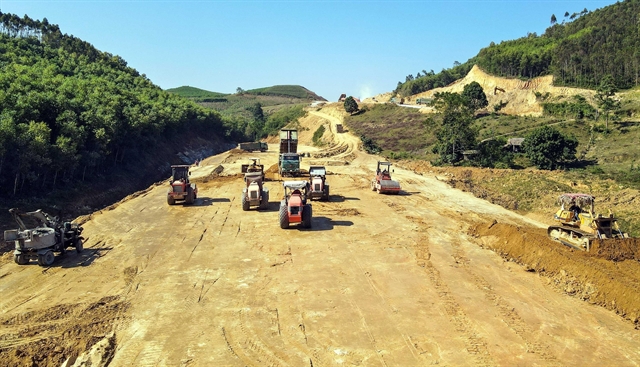 Society
Society


|
| The construction units are accelerating the construction of the Tuyên Quang - Phú Thọ expressway, passing through Yên Sơn District in the northern province of Tuyên Quang. — VNA/VNS Photo Vũ Quang |
HÀ NỘI — Deputy Prime Minister Lê Minh Khái has announced that there will be a strict enforcement of financial discipline and careful management of the State budget in 2024 to ensure cost-effectiveness and compliance to the budget approved by the National Assembly.
This is one of the key tasks outlined in the Government's comprehensive programme on thrift practice and the fight against waste in 2024.
Under Decision No. 1764/QĐ-TTg signed by the Deputy PM, there will be a synchronised, resolute and effective implementation of the tasks and solutions to mobilise resources for salary reform. This helps maintain macro-economic stability, control inflation and ensure the overall balance of the economy.
Stringent measures will be taken to save regular expenses and eliminate unnecessary spending to secure resources for disaster prevention, disease control, and continue implementing policies for salary reform. Tight control will be exercised over the planning, allocation, management and use of State budget funds, especially for procurement, repairs, renovations, upgrades, and construction of new projects.
Regarding the management and use of public investment capital, the allocation of State budget funds will be concentrated, with a focus and priority. Outstanding debts for basic construction will be settled in accordance with legal regulations and all remaining capital must be recovered in the medium-term public investment plan for the 2021-25 period. Disciplinary measures will be tightened, and violations hindering the progress of capital allocation and disbursement will be addressed.
In managing State-owned enterprise capital and assets, the restructuring plan for State-owned enterprises will be prioritised. Specific measures will be taken to accelerate the equitisation and divestment of State capital from enterprises, resolving conclusively the scattered investment situation outside the industry and enhancing management capabilities.
In terms of organisational structure, labour management, and working hours, there will be a strong emphasis on streamlining the apparatus to reduce the staff size by at least 5 per cent for officials and public employees and at least 10 per cent for civil servants receiving salaries from the State budget. This is identified as a fundamental task to implement salary reform.
The Government will continue implementing administrative reform, with a focus on simplifying administrative procedures as a priority, to ensure the effective implementation of the comprehensive programme for administrative reform in the State sector for the 2021-30 period.
Ministries and sectors have been urged to implement the socio-economic recovery and development programme, aiming to contribute to the Gross Domestic Product (GDP) growth of 6.0 - 6.5 per cent, with the per capita GDP reaching approximately US$4,700-4,730.
Measures to combat revenue losses, transfer pricing, tax evasion, debt recovery and State budget overspending will be tightened.
The Government also requested ministries and sectors to enhance the management, exploitation, and efficient use of land, with a particular focus on improving the amended Land Law to ensure land resources are managed and used efficiently. — VNS




